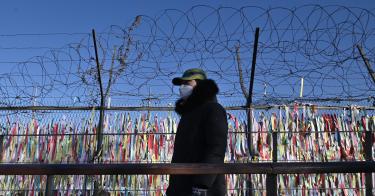On December 13th, South Korea’s National Assembly delivered a blow to civil liberties in Seoul and Pyongyang. The newly amended Law on the Development of Inter-Korean Relations Act stymies efforts by South Korean NGOs to promote information access in North Korea.
Colloquially known as the anti-leaflet law, the bill’s restrictive scope will be far more expansive than merely restricting the distribution of leaflets. It limits what can be sent into North Korea by broadly defining leaflets as advertisements, so-called propaganda, “auxiliary memory devices” like USBs, and even money. In addition, the amendment prohibits the posting of visual aids (such as posters) along the border area and makes it illegal to broadcast loudspeaker messages along the Military Demarcation Line.
The law will likely have a chilling effect on access to information inside North Korea, as well as on freedom of speech and of expression for South Koreans and South Korean NGOs. As my Heritage colleague and Senior Research Fellow for Northeast Asia Bruce Klingner notes, “Seoul acknowledged that the activists were exercising their right to free speech, but capitulated to North Korea’s demands by declaring that the leaflets were “harmful to national security.”
The amendment levies criminal penalties for violators of up to three years in jail or a fine of just under $30,000 for engaging in prohibited activities. In recent months, the Moon administration has directly targeted groups responsible for promoting information access in North Korea, like Fighters for a Free North Korea. The Ministry of Unification is currently investigating at least 289 NGOs, representing an unprecedented attack on the NGOs freedom to operate in South Korea. The Moon administration has even raided offices, filed criminal complaints, and restricted leaflet drops prior to the passage of the amendment.
One of the more worrisome consequences of this latest legislative action is the message it sends to Pyongyang. Some perceive it as kowtowing to the Kim regime’s demands. The original suspension of leaflet drops occurred in June in response to statements made by Kim Yo-Jong, Kim Jong-un’s sister and sanctioned chief North Korean propagandist, threatening retaliation for leaflet drops.
It’s hardly the first time such capitulations have taken place; in 2018, the Moon administration suspended loudspeaker broadcasts to soften the mood amidst inter-Korean diplomacy and the summitry between the U.S. and North Korea. It begs the question, if Pyongyang complains about freedom of information efforts and shapes the legislative agenda of the National Assembly, what will they ask for next?
Access to information is often a lifeline to the North Korean people. Defectors such as Yeonmi Park say that access to outside information, in her case watching the American film The Titanic, was the reason they decided to defect. Every North Korean who has access to outside information has more agency than they had prior to receiving that information. Perhaps it even provides hope and inspiration to courageously decide to flee or courageously decide to stay in North Korea.
While there are other ways to promote information access than leaflet drops (for example, via radio, through smuggling goods and information into the emerging markets, and even applying new technologies to penetrate North Korea’s information firewalls) South Korean NGOs shouldn’t be restricted in doing so. It’s a dangerous precedent to restrict activities because North Korea requests it—equally dangerous to restrict it over matters of opinion about the effectiveness of balloon drops relative to other forms of promoting freedom of information.
This latest move reveals the lengths the Moon administration will go to in order to ingratiate itself with the Kim regime. That the South Korean National Assembly and Moon administration would take its cues from a regime that restricts most commonly enjoyed and, frankly speaking, fundamental human rights, is troubling.
The next U.S. administration should do a better job of working with our ally South Korea to protect the democratic freedoms of people on both sides of the peninsula. The U.S. government should privately express its disapproval of the National Assembly’s latest amendment and look for ways to coordinate in promoting information access in North Korea. The U.S. should also improve its own efforts to advance freedom of information in North Korea by funding access efforts that make use of new and emerging technologies to penetrate North Korea’s closed-off society.
Both North Korean and South Korean people’s freedom is at stake. Should Seoul continue down this path, it may have a worrisome end—one that undermines the human rights and fundamental freedoms of people on both sides of the 38th parallel.
This piece originally appeared in Forbes



